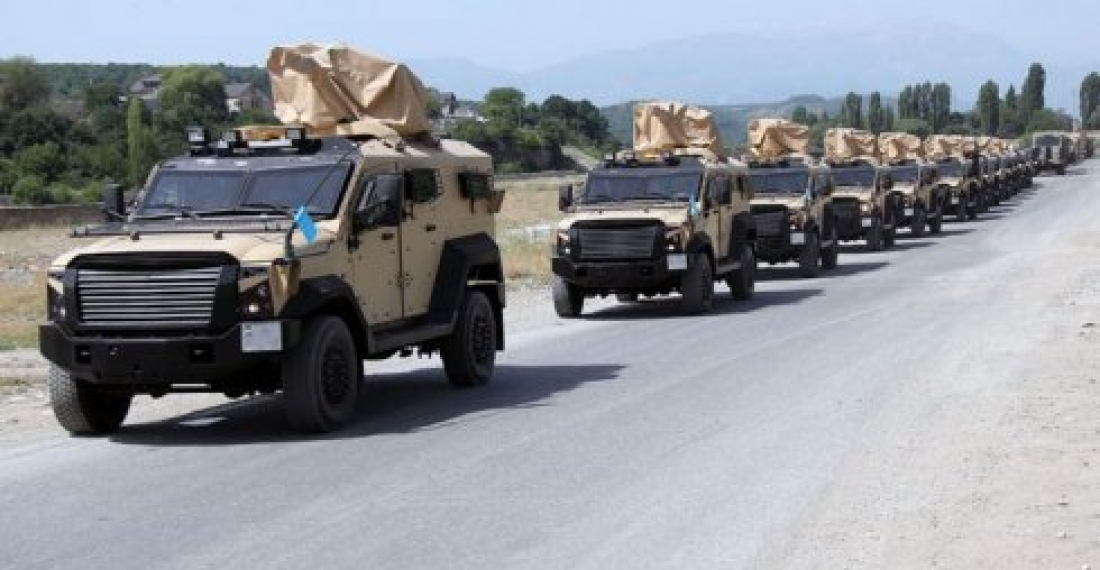В Азербайджане начались широкомасштабные межведомственные военные учения, которые продолжаться до пятницы.
Согласно пресс-релизу Министерства обороны Азербайджана, в учениях примут участие "до 20 000 военнослужащих, до 120 танков и других бронемашин, более 200 ракетных и артиллерийских орудий разных калибров, многоразовых ракетных комплексов и минометов, до 30 армейских подразделений и фронтовой авиации".
В Армении была высказана озабоченность по поводу проводимых учений. Как сообщает Day.Az, пресс-секретарь Министерства иностранных дел Армении Тигран Балаян заявил, что эти учения нарушают Венский документ ОБСЕ. Часть 5 документа о мерах доверия и безопасности обязывает Азербайджан сообщать о намерениях любых военных учений за 42 дня до факта, что по словам Балаяна не было сделано. Балаян далее подчеркнул: "Армянская сторона постоянно поднимает - на платформе ОБСЕ - проблему нарушения Азербайджаном режима контроля над вооружениями и мер укрепления доверия и безопасности ОБСЕ, подчеркивая, что такие безответственные шаги угрожают безопасности и миру региона ОБСЕ".
Азербайджан отвергает эти обвинения и говорит, что Армения незаконно занимает ее территорию, и, кроме того, она не сообщает о развертывании своих войск на этих оккупированных территориях под тем предлогом, что они попадают под юрисдикцию самопровозглашенной Нагорно-Карабахской Республики, которая непризнана, и которая не подписывала международные соглашения о контроле над вооружениями.
Учения на этой недели последовали сразу после перестрелки между двумя сторонами в Нахчыване в минувшие выходные. Армения утверждает, что уничтожила азербайджанский пост, когда обнаружила в этом районе проведение инженерных работ.
Пресс-секретарь Минобороны Армении Арцрун Оганесян заявил на своей странице в Facebook, что эти работы были призваны укрепить военные позиции Азербайджана вблизи границы и, что армянские войска успешно уничтожили одну из структур. Как сообщалось, один армянский контрактник был слегка ранен в результате столкновения. Как сообщает News.am Тигран Балаян заявил, что его Министерство проинформировало Организацию Договора о коллективной безопасности (ОДКБ) об инцидентах. ОДКБ - это военный альянс, возглавляемый Россией, членом которого является Армения, а Азербайджан - нет.
По словам Panorama.am, 2 июля глава Генштаба Армении сообщил СМИ, что «непосредственной угрозы войны нет» и что силы Армении «полностью контролируют ситуацию в Нахчыванском направлении». Он добавил, что они «внимательно следят за учениями и готовы к любому развитию ситуации», также признав: «Мы исходим из того, что война может начаться в любое время».
Что касается встречи в эти выходные в Нахчыване, азербайджанские СМИ не сообщили ничего конкретного, кроме общих обвинений в нарушениях режима прекращения огня со стороны Армении. Однако во вторник (3 июля) Министерство обороны Азербайджана сообщило о начале тактических военных учений в Нахчыване. Неясно, стали ли эти учения продолжением более крупных учений, о которых сообщалось ранее.
источник: commonspace.eu
фото: Подразделения азербайджанской армии развернуты перед крупномасштабными военными учениями, которые начались 2 июля (фото предоставлено АПА, Баку)







